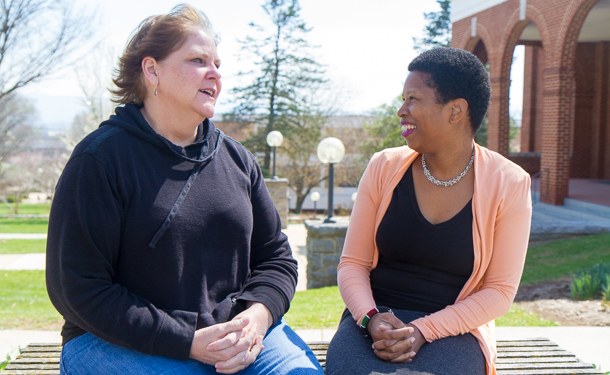After recently becoming the first university in the country to offer a graduate certificate in restorative justice in education, Eastern Mennonite University will soon begin working with school and community leaders in Jackson, Mississippi, to introduce restorative practices to the city’s public school system.
In March 2016, the W.K. Kellogg Foundation (WKKF) announced a $61,000 grant that will fund a restorative justice in education pilot project in Jackson Public Schools (JPS), which serves 28,000 students in Mississippi’s largest city. The 15-month planning grant will involve EMU’s Center for Justice and Peacebuilding (CJP) and staff and faculty from the MA in Education program, as well as school officials and community leaders in Jackson.
According to Margrit Wallace, executive director of student academic and behavioral support for JPS, the district has been working for years on improving school climate and believes embracing restorative justice practices can further that goal.
“It fits in the big picture of what we’re trying to implement,” said Wallace. “[It has] all the pieces that it would take for us to have a high-functioning learning environment that’s not only meeting that academic needs of our learners but also meeting the social and emotional needs that they have.”
Partnering with local community experts
Circle processes are an example of one restorative practice that have been successfully used in school settings both as a community-building tool and an alternative method of addressing disciplinary issues. By adopting these sorts of processes, some school districts have been able to drastically reduce suspension rates.
“We have a great deal of expertise in restorative justice in education,” said assistant professor of education Kathy Evans, one of the faculty members involved with the grant. “What we don’t have a great deal of expertise in is Jackson. What makes sense to me is … collaboratively building something really beautiful, because we each bring our own sets of knowledge and understanding.”
Evans and Johonna Turner, an assistant professor of restorative justice and peacebuilding also involved with the grant, both said that EMU’s priority in the coming months will be surveying existing efforts to improve school climate in Jackson and identifying ways in which EMU’s support could be most beneficial.
“We’re not sure yet what will come out of it, but I think that’s exciting” said Turner.
Evans added that like-minded organizations and programs in the wider community will also be partners in the project.
“What too often happens is the school becomes this isolated entity, and we try to fix the problems of the school [while] ignoring the fact that the school lives in the context of that community,” she said. “The school needs community partners, and the school impacts the community. They aren’t separate entities.”
That was one aspect of the grant proposal that caught the attention of the WKKF.
“We love that they’ve taken the time to really plan,” said Yumeka Rushing, WKKF program officer for Mississippi. “I think it’s really important to take a step back and engage all of the stakeholders.”
“I think the one thing that we really haven’t done in most school districts is actually say, ‘What if we focus on building relationships? What if we look at the power of restorative practices … and when students have a greater sense of belonging, they in turn are more invested in the process of learning, resulting in teachers more excited about and adept at teaching?” says Sarah Armstrong, director of the MA in Education program at EMU. “I think this is a place that educators in most school districts have not really explored, and I really think we can find some very important answers if we look at RJE.”
Careful planning leads to implementation
Although EMU originally wrote a grant request to fund projects in Jackson, Washington D.C., and its hometown of Harrisonburg, Virginia, the proposal was later scaled back to Jackson.
“This project is a perfect opportunity to do so in a way that could have major long-term benefit for children throughout the state of Mississippi,” said CJP executive director Daryl Byler. “In other parts of the country where restorative justice is being used in classrooms, the results are encouraging. Suspensions and expulsions are greatly reduced, academic performance is improved and classroom behaviors are improved.”
EMU faculty and staff will visit Jackson at least three times during the course of the planning grant. They are also planning learning trips with school and community leaders from Jackson to Oakland, California, and Miami, Florida, to visit school systems that have been successfully using restorative practices to strengthen community within and around schools.
During the planning grant process, EMU and its partners in Jackson will also develop a subsequent, three-year grant proposal that would include specific restorative justice training and implementation, according to the needs identified in Jackson over the next 15 months.
Armstrong said the implementation phase of the grant may include enrollment of a JPS cohort in the MA in Education program, pursuing either a full master’s degree with a restorative justice concentration, or a graduate certificate offered to educators who already have a master’s degree.
“I’m very open going into this process,” said Wallace, of JPS. “The beauty of a planning grant is that we can all bring our own hopes for what we want to see happen.”
“We believe this is not only going to change our district, but our city,” she added.
